Intro
Explore mental health therapy options, including counseling, psychotherapy, and cognitive-behavioral therapy, to manage stress, anxiety, and depression, and improve overall well-being with professional guidance and support.
The importance of mental health cannot be overstated, as it plays a significant role in our overall well-being and quality of life. With the increasing awareness of mental health issues, more and more people are seeking help and support to manage their conditions. One of the most effective ways to address mental health concerns is through therapy, which offers a safe and supportive environment to explore and work through challenging emotions, thoughts, and behaviors. In this article, we will delve into the various mental health therapy options available, exploring their benefits, working mechanisms, and what to expect from each.
Mental health therapy, also known as psychotherapy, is a type of treatment that helps individuals cope with mental health issues, such as anxiety, depression, trauma, and relationship problems. Therapy provides a unique opportunity for individuals to gain a deeper understanding of themselves, develop coping strategies, and improve their overall mental health and well-being. With the numerous therapy options available, it can be overwhelming to choose the right one. However, by understanding the different types of therapy and their approaches, individuals can make informed decisions about their mental health care.
The decision to seek therapy is a brave and important step towards taking control of one's mental health. With the right therapist and approach, individuals can experience significant improvements in their mental health and overall quality of life. Whether struggling with a specific mental health condition or simply looking to enhance personal growth and self-awareness, therapy can provide a supportive and non-judgmental space to explore and work through challenges. In the following sections, we will explore the various mental health therapy options, including their benefits, working mechanisms, and what to expect from each.
Mental Health Therapy Options
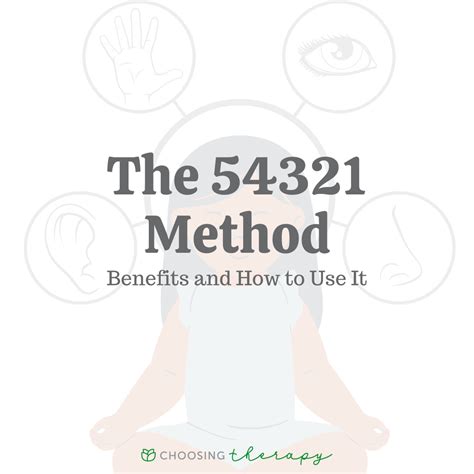
There are numerous mental health therapy options available, each with its unique approach and benefits. Some of the most common types of therapy include cognitive-behavioral therapy (CBT), psychodynamic therapy, humanistic therapy, and family therapy. CBT focuses on identifying and changing negative thought patterns and behaviors, while psychodynamic therapy explores the underlying causes of mental health issues, such as past experiences and relationships. Humanistic therapy emphasizes personal growth and self-actualization, and family therapy involves working with the entire family unit to address relationship dynamics and communication patterns.
Cognitive-Behavioral Therapy (CBT)
Cognitive-behavioral therapy is a problem-focused approach that helps individuals identify and change negative thought patterns and behaviors. CBT is commonly used to treat anxiety, depression, and trauma, and has been shown to be highly effective in reducing symptoms and improving mental health outcomes. This type of therapy typically involves working with a therapist to identify and challenge negative thoughts, develop coping strategies, and practice new skills.Benefits of Therapy
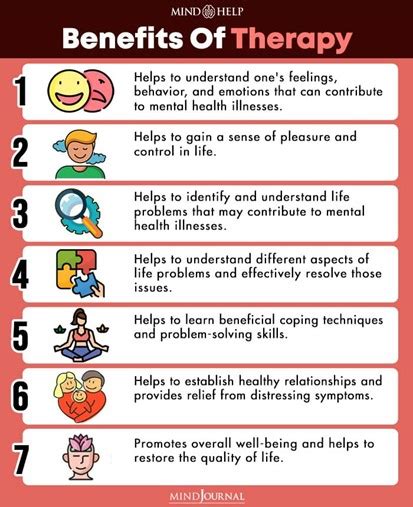
The benefits of therapy are numerous and well-documented. Some of the most significant advantages of therapy include improved mental health outcomes, increased self-awareness, and enhanced coping skills. Therapy provides a safe and supportive environment to explore and work through challenging emotions, thoughts, and behaviors, and can help individuals develop a greater understanding of themselves and their place in the world. Additionally, therapy can improve relationships, increase self-esteem, and enhance overall quality of life.
How Therapy Works
Therapy typically involves working with a trained therapist to identify and address mental health concerns. The therapeutic relationship is built on trust, empathy, and understanding, and provides a unique opportunity for individuals to explore and work through challenging emotions, thoughts, and behaviors. The therapist will work with the individual to develop a treatment plan, which may involve setting goals, practicing new skills, and developing coping strategies. Therapy can be conducted in individual, group, or family settings, and may involve a combination of talking, writing, or other forms of expression.Types of Therapy
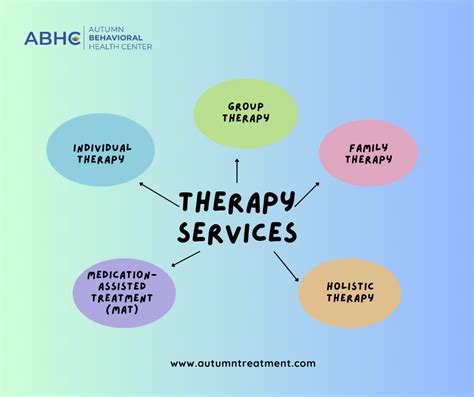
There are numerous types of therapy available, each with its unique approach and benefits. Some of the most common types of therapy include:
- Cognitive-behavioral therapy (CBT)
- Psychodynamic therapy
- Humanistic therapy
- Family therapy
- Dialectical behavior therapy (DBT)
- Mindfulness-based therapy
- Art therapy
- Music therapy
Each type of therapy has its own unique approach and benefits, and may be more or less suitable depending on the individual's specific needs and circumstances. By understanding the different types of therapy and their approaches, individuals can make informed decisions about their mental health care and choose the therapy that best meets their needs.
What to Expect from Therapy
What to expect from therapy can vary depending on the type of therapy and the individual's specific needs and circumstances. However, some common elements of therapy include: * An initial consultation or assessment to discuss goals and develop a treatment plan * Regular sessions with a therapist, which may involve talking, writing, or other forms of expression * A focus on identifying and addressing mental health concerns, such as anxiety, depression, or trauma * The development of coping strategies and new skills to manage challenging emotions, thoughts, and behaviors * A supportive and non-judgmental environment to explore and work through challenging emotions, thoughts, and behaviorsFinding the Right Therapist
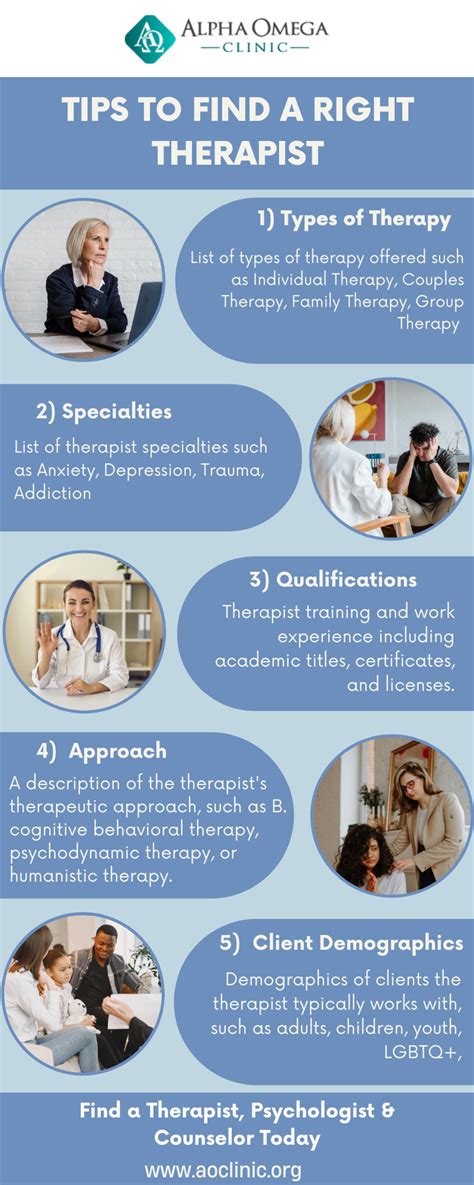
Finding the right therapist is an important part of the therapeutic process. Some factors to consider when choosing a therapist include:
- Credentials and qualifications, such as licensure and experience
- Specialty or area of expertise, such as anxiety, depression, or trauma
- Therapeutic approach, such as CBT, psychodynamic therapy, or humanistic therapy
- Personal style and rapport, such as empathy, understanding, and communication skills
- Availability and location, such as in-person or online sessions
By considering these factors and doing research, individuals can find a therapist who meets their needs and provides a supportive and non-judgmental environment to explore and work through challenging emotions, thoughts, and behaviors.
Online Therapy Options
Online therapy options have become increasingly popular in recent years, offering a convenient and accessible way to access mental health care. Online therapy can involve video conferencing, phone calls, or messaging, and may be conducted individually or in groups. Some benefits of online therapy include increased accessibility, convenience, and flexibility, as well as reduced costs and improved anonymity.Mental Health Resources
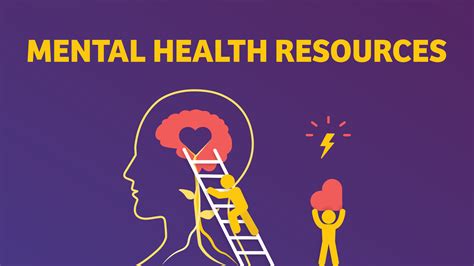
There are numerous mental health resources available, including:
- National Alliance on Mental Illness (NAMI)
- American Psychological Association (APA)
- Substance Abuse and Mental Health Services Administration (SAMHSA)
- Mental Health America (MHA)
- Crisis Text Line (text "HOME" to 741741)
These resources provide information, support, and guidance for individuals struggling with mental health issues, as well as their families and loved ones.
Mental Health Statistics
Mental health statistics highlight the importance of addressing mental health concerns and seeking help when needed. Some notable statistics include: * 1 in 5 adults in the United States experience mental illness each year * 1 in 20 adults in the United States experience serious mental illness each year * 50% of mental health issues begin by age 14 * 75% of mental health issues begin by age 24These statistics emphasize the need for increased awareness, understanding, and support for mental health issues, as well as the importance of seeking help when needed.
Conclusion and Next Steps

In conclusion, mental health therapy options offer a supportive and non-judgmental environment to explore and work through challenging emotions, thoughts, and behaviors. By understanding the different types of therapy and their approaches, individuals can make informed decisions about their mental health care and choose the therapy that best meets their needs. Whether struggling with a specific mental health condition or simply looking to enhance personal growth and self-awareness, therapy can provide a unique opportunity for individuals to gain a deeper understanding of themselves and develop coping strategies to manage challenging emotions, thoughts, and behaviors.
We invite you to share your thoughts and experiences with mental health therapy options in the comments below. If you or someone you know is struggling with mental health issues, please seek help and support from a qualified mental health professional. You can also share this article with others to help raise awareness and promote understanding of mental health concerns.
What is mental health therapy?
+Mental health therapy, also known as psychotherapy, is a type of treatment that helps individuals cope with mental health issues, such as anxiety, depression, trauma, and relationship problems.
How do I find the right therapist?
+Finding the right therapist involves considering factors such as credentials, specialty, therapeutic approach, personal style, and availability. You can also ask for referrals from friends, family, or a primary care physician.
What are the benefits of online therapy?
+Online therapy offers increased accessibility, convenience, and flexibility, as well as reduced costs and improved anonymity. It can also provide a sense of comfort and security for individuals who prefer to receive therapy from the comfort of their own home.
